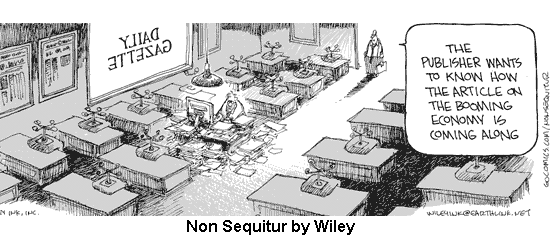Not only is our lifestyle on back-order, so is our sanity.
Yesterday I mentioned our collective inability to make sense of the contradictory messages of the status quo and our own experience. This inability to reconcile completely contradictory messages generates psychosis, an internal breakdown that manifests as a disconnect from reality.
To take one example: we're constantly bombarded with the message that a four-year college diploma is the essential key to a secure middle-class lifestyle, yet our experience is that millions of college grads are living precariously, burdened by extremes of student loan debt.
Here's another I discussed yesterday: the status quo hypes the stock market's near-record highs as "proof" all is well and everything's getting back to "normal" but our experience is the real economy is in a stumbling free-fall.
And what is that "old normal" everyone is so anxious to return to anyway? How about too busy to be healthy, too addicted to social media to have agency? Or as the writer of Small Family Farms Aren't the Answer wrote: "In short, we've done the most modern-American thing possible: bartered away our quality of life for the freedom to be miserable."
As for the "new normal," it's Extremes of Neofeudalism, Incompetence and Authoritarianism (June 30, 2020).
In other words, to keep us in thrall to an unsustainable status quo, what's been normalized and institutionalized is social psychosis, breakdown and burnout.
Our experience is shaped by what psychiatrist R.D. Laing identified as the Politics of Experience. While Laing's initial focus was on family dynamics (Sanity, Madness and the Family: Families of Schizophrenics) and how conflicting demands (contradictory political "necessities") within a family can trigger a breakdown in children, his insights also apply to society at large.
Laing explores the way our internalized interpretation of experience can be shaped to create uniform beliefs about our society and economy that then lead to norms of behavior that support the political/economic status quo.
Here's how Laing described the social ramifications in Chapter Four Politics of Experience:
"All those people who seek to control the behavior of large numbers of other people work on the experiences of those other people. Once people can be induced to experience a situation in a similar way, they can be expected to behave in similar ways. Induce people all to want the same thing, hate the same things, feel the same threat, then their behavior is already captive - you have acquired your consumers or your cannon-fodder."
For Laing, the politics of experience is not just about influencing social behavior; it has an individual, inner consequence as well:
"Our behavior is a function of our experience. We act according to the way we see things. If our experience is destroyed, our behavior will be destructive. If our experience is destroyed, we have lost our own selves."
One manifestation of this destruction is the shunting of systemic failure onto the individual. The system itself cannot be seen as a failure, so all failure must be pinned on the individual.

Those of you who have read Survival+ will gain a new perspective on opting out, protected fiefdoms, when belief in the system fades, profound political disunity, plantation-like structures, derealization, radical self-reliance, asymmetric stakes in the game, induced amnesia and other ideas I have presented on the politics of experience over the years.
Contradictory political "necessities" are destroying our internal coherence, our social order and our economy. Not only is our lifestyle on back-order, so is our sanity.

Recent Podcasts:
Audiobook edition now available:
Will You Be Richer or Poorer?: Profit, Power, and AI in a Traumatized World ($13)
(Kindle $6.95, print $11.95) Read the first section for free (PDF).
Will You Be Richer or Poorer?: Profit, Power, and AI in a Traumatized World ($13)
(Kindle $6.95, print $11.95) Read the first section for free (PDF).
Pathfinding our Destiny: Preventing the Final Fall of Our Democratic Republic ($6.95 (Kindle), $12 (print), $13.08 ( audiobook): Read the first section for free (PDF).
The Adventures of the Consulting Philosopher: The Disappearance of Drake $1.29 (Kindle), $8.95 (print); read the first chapters for free (PDF)
Money and Work Unchained $6.95 (Kindle), $15 (print) Read the first section for free (PDF).
If you found value in this content, please join me in seeking solutions by becoming a $1/month patron of my work via patreon.com.
If you found value in this content, please join me in seeking solutions by becoming a $1/month patron of my work via patreon.com.
NOTE: Contributions/subscriptions are acknowledged in the order received. Your name and email remain confidential and will not be given to any other individual, company or agency.
Thank you, Lisa P. ($100), for your outrageously generous contribution to this site -- I am greatly honored by your steadfast support and readership.
|
Thank you, Dave M. ($5/month), for your marvelously generous pledge to this site -- I am greatly honored by your support and readership.
|
